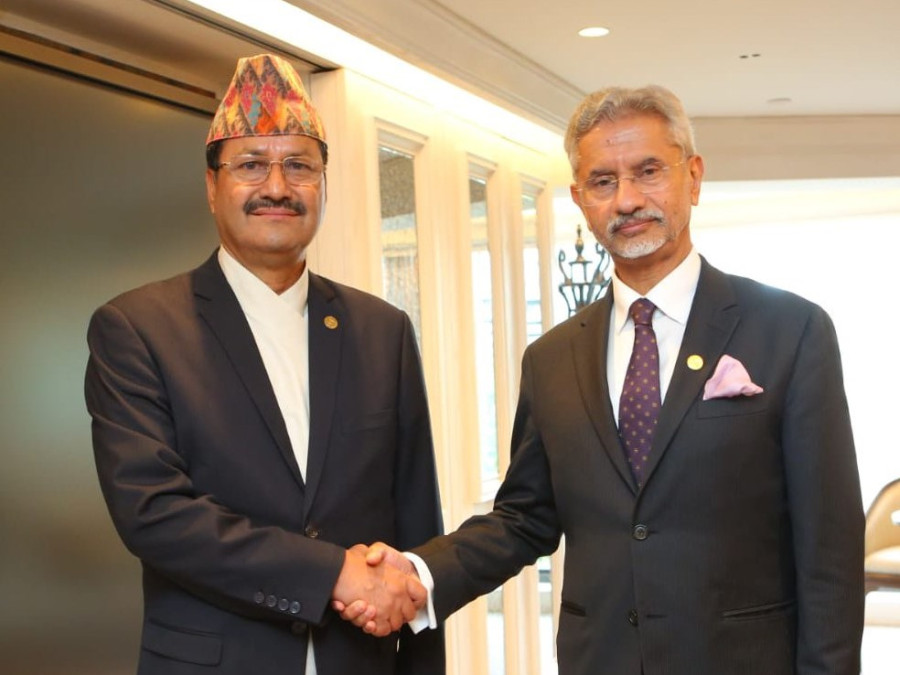Official communication is that Minister S Jaishankar will visit Kathmandu after the G-20 Summit in New Delhi

The seventh round of Nepal-India joint commission meeting at the foreign minister level will be convened by mid-October, preparations for which are underway on both sides, officials said.
It is Nepal’s turn to host the meeting in Kathmandu. Once the date of the meeting is finalized, a formal invitation will be sent by foreign minister NP Saud to his Indian counterpart, S Jaishankar.
The joint commission is the apex body to look into the bilateral relations and was formed during the Nepal visit of the then Indian prime minister Chandra Shekhar in February 1991. The meeting of the joint commission takes up entire bilateral issues between Nepal and India and convenes alternately in the two countries on a mutually agreed date.
During the state visit of Prime Minister Pushpa Kamal Dahal to India in 2017, both sides had agreed to restart meetings of the joint commission that hadn’t been convened for a long time.
Foreign Ministry officials told the Post that a meeting is planned by mid-October, but it can convene at the end of September or during the first half of October. The Indian government has communicated to its Nepali counterpart that after the G-20 Summit in New Delhi, its Minister for External Affairs Jaishankar will travel to Kathmandu.
Ahead of the meeting of the joint commission, the two sides are planning to hold the meetings of the joint steering committee and joint working committee in order to discuss issues related to energy, water resources, inundation and power trade in Chitwan. These are the permanent mechanisms to deal with issues related to energy, water resources, inundation and power trade.
The joint steering committee is a secretary-level mechanism and the working committee is led by joint secretaries from both sides.
“We are consulting the Indian side in order to convene the meeting in October,” Foreign Minister Saud said. “Both sides are consulting each other to fix the date where we will discuss and agree on several issues of bilateral interest.”
The highest-level bilateral mechanism between the two countries was set up to discuss and address all aspects of bilateral relations and to remove bottlenecks, if any.
During the recent BIMSTEC Foreign Ministers’ Retreat held in Bangkok, Foreign Minister Saud invited Jaishankar to attend the meeting in Kathmandu for it is Nepal’s turn to host the meeting, said an official who had accompanied Saud to the retreat.
“The upcoming meeting will review the entire gamut of Nepal-India ties as well as take stock of the agreements and understandings reached between Nepal and India during the recent visit of Prime Minister Pushpa Kamal Dahal to India,” said a foreign ministry official.
Prime Minister Dahal was on a state visit to India from May 31 to June 2.
The last meeting of the joint commission had taken place in New Delhi on January 15, 2021 in the wake of a boundary dispute between Kathmandu and New Delhi after the KP Sharma Oli-led government unveiled a new political map of Nepal incorporating the territories of Kalapani, Lipu Lekh and Limpiyadhura in its territory, which are currently occupied by India.
In their last meeting, both sides had discussed issues of mutual interest, supply of Covid vaccine, boundary and border management, connectivity and economic cooperation, trade and transit, power and water resources, besides culture and education.
According to Nepali officials, the upcoming joint commission meeting will follow up on the understandings reached between the two sides during the official visit of Prime Minister Dahal, including cross-border
infrastructure and connectivity, strengthening of development partnership and expeditious implementation of major ongoing projects and initiatives,
establishment of an earth station in Nepal with Indian assistance, construction of integrated check posts, railway links, power transmission lines and upgrade of roads and motorable bridges.
Also, the meeting will also take up matters like speeding up the implementation of the ongoing and planned bilateral projects such as the new Integrated Check Posts/Inland Container Depot, including at Dodhara-Chandani, remaining cross-border railways, roads, and transmission lines, trade facilitation, inundation problems people living in the border areas face, especially due to non-tagging of embankments, interlinking of drains, and inadequate drainage provisions.












